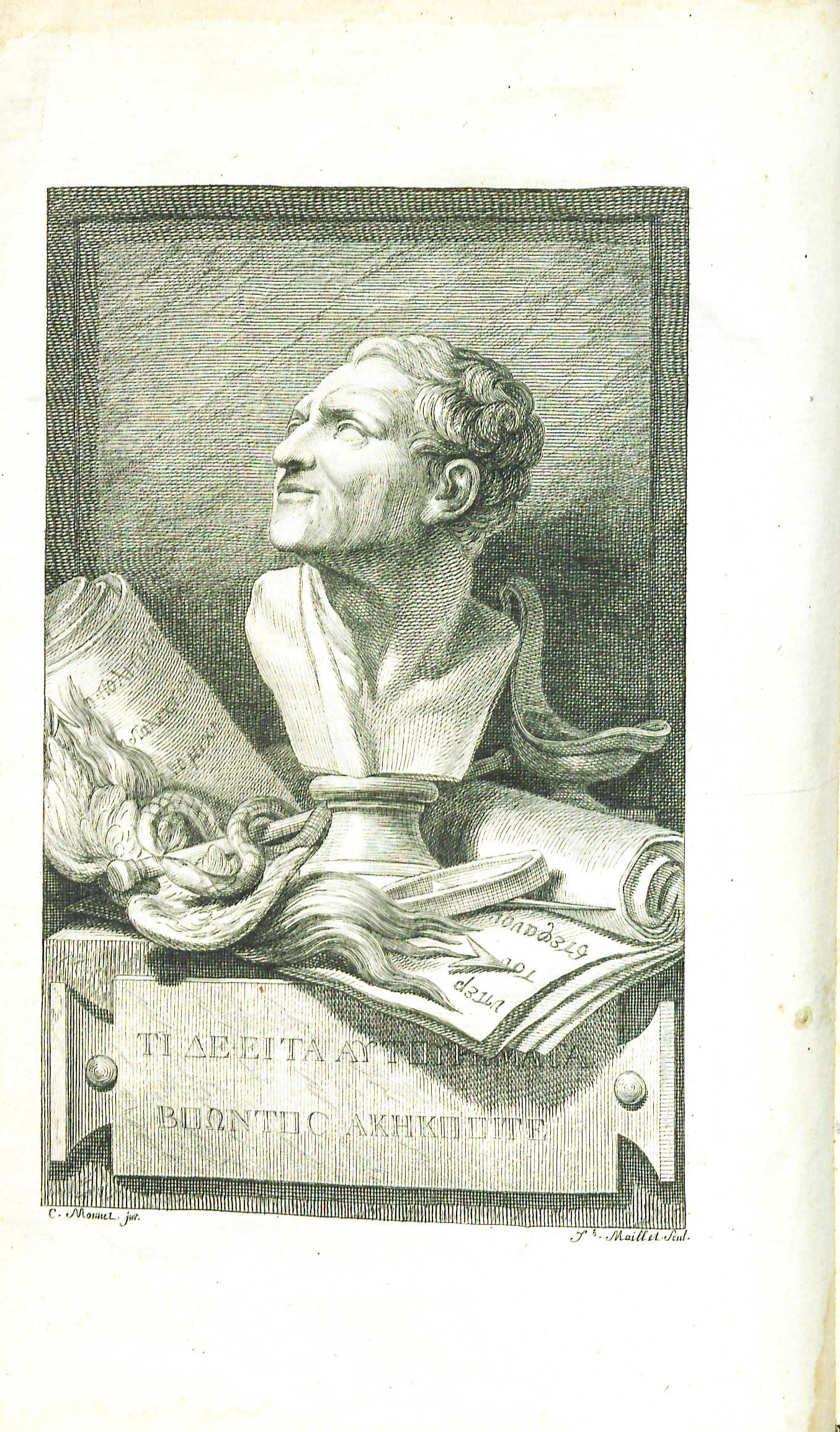Difference between revisions of "Œuvres Complettes de Démosthene et d'Eschine"
Dbthompson (talk | contribs) (→Description of the Wolf Law Library's copy) |
(→Description of the Wolf Law Library's copy) |
||
| Line 28: | Line 28: | ||
==Description of the Wolf Law Library's copy== | ==Description of the Wolf Law Library's copy== | ||
| − | Bound in quarter green calf. Spines have gilt bands and lettering. Two parts of volume two bound together. Library is missing volumes three and four. | + | Bound in quarter green calf. Spines have gilt bands and lettering. Two parts of volume two bound together. Library is missing volumes three and four. |
| − | + | ||
Images of the library's copy of this book are [https://www.flickr.com/photos/wolflawlibrary/sets/72157637446450665 available on Flickr.] View the record for this book in [https://catalog.swem.wm.edu/law/Record/3695139 William & Mary's online catalog]. | Images of the library's copy of this book are [https://www.flickr.com/photos/wolflawlibrary/sets/72157637446450665 available on Flickr.] View the record for this book in [https://catalog.swem.wm.edu/law/Record/3695139 William & Mary's online catalog]. | ||
Revision as of 13:21, 14 October 2015
by Demosthenes and Aeschines
| Œuvres Complettes de Démosthene et d'Eschine | |
|
Title page from Œuvres Complettes de Démosthene et d'Eschine, volume one, George Wythe Collection, Wolf Law Library, College of William & Mary. | |
| Author | Demosthenes and Aeschines |
| Translator | Abbé Athanese Auger |
| Published | Paris: Lacombe |
| Date | 1777 |
| Language | French |
| Volumes | 4 volumes in 5 volume set |
| Desc. | 8vo (20 cm.) |
| Location | Shelf H-2 |
Demosthenes developed his skills as an orator by studying speeches given by earlier great orators.[4] He transferred his talents as an orator and writer into a successful professional speech-writing career.[5] During his time as a speech-writer Demosthenes developed an interest in politics; he went on to devote most of his career to opposing Macedon’s expansion.[6] He spoke out against both Philip II of Macedon and Alexander the Great.[7] Demosthenes played a leading role in his city’s uprising against Alexander. The revolt was met with harsh reprisals and Demosthenes took his own life to prevent being arrested.[8]
Demosthenes’ oratory works were highly influential during the Middle Ages and Renaissance,[9] and inspired the authors of the Federalist Papers and the major orators of the French Revolution.[10]
Aeschines (389-314 BCE) was a Greek statesman, orator, and bitter political opponent of Demosthenes. He was raised in humble circumstances and worked as an actor before becoming a member of the embassies to Philip II.[11] He eventually provoked Philip II to establish Macedonian control over central Greece.[12] Unlike Demosthenes, Aeschines was a proponent of Macedonian expansion. The two orators collided when Aeschines brought suit against a certain Ctesiphon for proposing the award of a crown to Demosthenes in recognition of his services to Athens.[13] Aeschines suffered a resounding defeat in the trial and subsequently left Athens for Rhodes where he taught rhetoric.[14]
Evidence for Inclusion in Wythe's Library
Listed in the Jefferson Inventory of Wythe's Library as "Oeuvres de Demosthene & do Eschine par Auger. Fr. 5.v. 8vo." and kept by Thomas Jefferson. Later sold by Jefferson to the Library of Congress.[15] Jefferson's copy of the 1777 edition of Œuvres Complettes de Démosthene et d'Eschine is still at the Library of Congress, but it has no definitive Wythe markings. Nevertheless, both the Brown Bibliography[16] and George Wythe's Library[17] on LibraryThing list this copy as the one which once belonged to George Wythe. Accordingly, the Wolf Law Library moved a copy of the same work into the George Wythe Collection.
Description of the Wolf Law Library's copy
Bound in quarter green calf. Spines have gilt bands and lettering. Two parts of volume two bound together. Library is missing volumes three and four.
Images of the library's copy of this book are available on Flickr. View the record for this book in William & Mary's online catalog.
See also
- Dēmosthenous Logoi Eklektoi = Demosthenis Selectæ Orationes
- George Wythe Room
- Jefferson Inventory
- Wythe's Library
References
- ↑ Ian Worthington, Demosthenes: Statesman and Orator (London: Routledge, 2000), 162.
- ↑ Ibid., 186.
- ↑ Ibid.
- ↑ Ibid., 240.
- ↑ Encyclopædia Britannica Online, s.v. "Demosthenes," accessed October 24, 2013.
- ↑ Ibid.
- ↑ Ibid.
- ↑ Ibid.
- ↑ Ibid.
- ↑ Konstantinos Tsatsos, "XV" in Demosthenes (Athens: Estia, 1975), 352.
- ↑ Encyclopædia Britannica Online, s.v. "Aeschines," accessed November 14, 2013.
- ↑ Ibid.
- ↑ Ibid.
- ↑ Ibid.
- ↑ E. Millicent Sowerby, Catalogue of the Library of Thomas Jefferson, 2nd ed. (Charlottesville: University Press of Virginia, 1983), 5:24 [no.4664].
- ↑ Bennie Brown, "The Library of George Wythe of Williamsburg and Richmond," (unpublished manuscript, May, 2012) Microsoft Word file.
- ↑ LibraryThing, s.v. "Member: George Wythe" accessed on April 28, 2013.
External Links
Read volume one of this book in Google Books.
Read volume two of this book in Google Books.
Read volume three of this book in Google Books.

